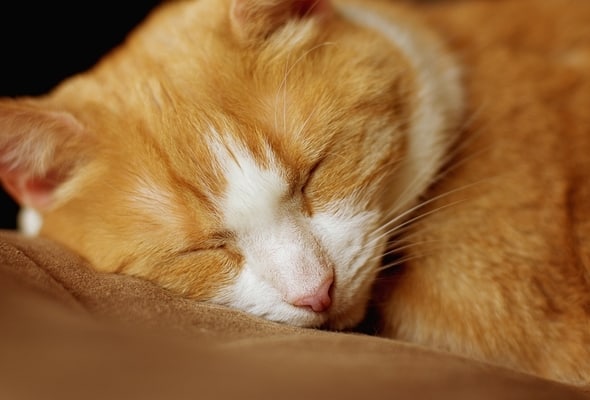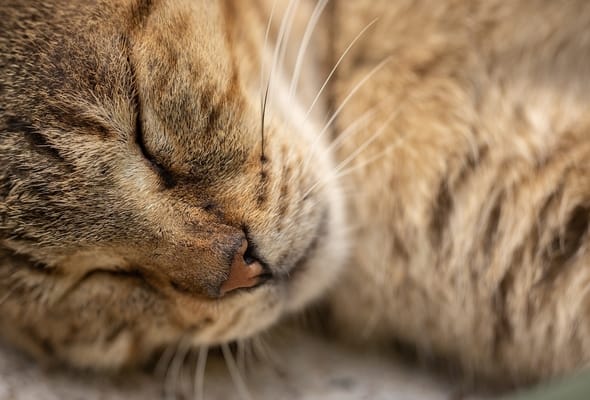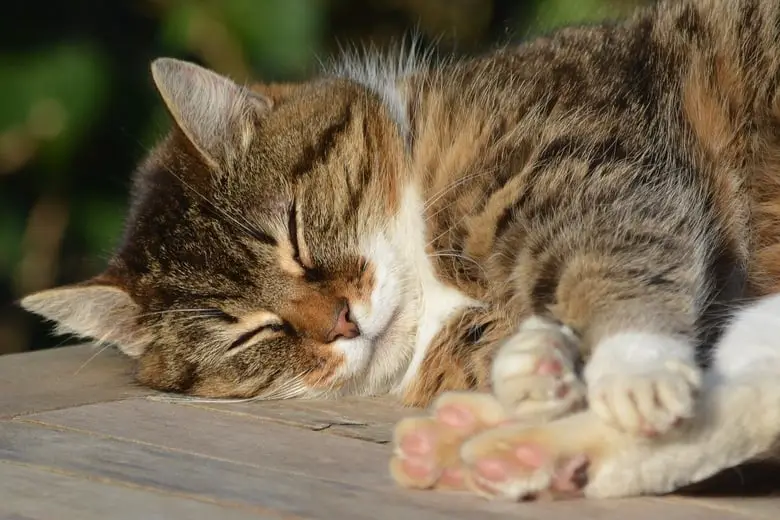The life of a domestic cat is a charmed one, with a schedule typically consisting of meal-time, treat-time, head-scratches-time, chasing-the-mouse-on-a-stick-time, and most importantly, nap-time.
Cats love their rest and relaxation, but you may have noticed that some doze far more than others.
This raises the question, is it normal for cats to sleep all day? Having an understanding of your cat’s sleeping patterns will help you monitor any changes, and keep track of their health and wellbeing.
Is It Normal for Cats to Sleep All Day?
Yes, it is considered normal for cats to sleep all day. More than half of domesticated cats sleep between twelve and eighteen hours each day. In addition, the other 40% of cats, give or take, sleep more than eighteen hours a day.
One of the primary reasons cats sleep so much is to conserve their energy. As you may have noticed, they are prone to making sudden, wild dashes, commonly called ‘The Zoomies’.
Sometimes they do this to re-energize and reinvigorate themselves after a restful period. Other times, they may be pursuing imaginary prey, exercising their innate hunting instinct.
A cat’s playtime is energetic and vigorous, and they often literally throw themselves into it without any restraint . It is completely normal for a cat to bring their inherent intensity to anything they do, from chasing invisible birds to napping for hours on end.
However, significant changes in your cat’s sleeping habits may indicate an underlying health issue, stress, or boredom, so it is imperative to be mindful of their patterns and seek veterinary attention if they are behaving in a way that is out of character.
Should I Let My Cat Sleep All Day?
Most cats sleep around sixteen hours a day, with kittens and senior cats requiring even more rest than that. Many cat owners wish their kitties would sleep a little less and spend more time with them, and that’s understandable.

Playing with and petting your cat is an immensely relaxing, enjoyable activity! Cats have super-sensitive scent glands all over their bodies that release feel-good hormones when you pet them.
The act of petting fosters a sense of well-being and familiarity between you and your cat and strengthens your bond. For cats and owners alike, it can be an addictive sensation!
However, your cat needs time to rest to be their best mentally and physically. Extended periods of sleep are vital for your cat’s bodies to regulate the hormones that are necessary to their daily functioning.
These hormones send out chemical signals that enable your cat to connect with other cats, mark their territory, foster bonds with their offspring, and self-soothe. Inadequate rest can impact your cat’s essential daily functions.
Should I Be Worried if My Cat Sleeps All Day?
Whether you should be worried about your cat’s sleeping habits depends on several factors. One is their age. It is common for newborn and elderly cats to sleep the day away, sometimes up to twenty hours within a twenty-four-hour period.

Teenage cats require less sleep and can be erratic in their schedule, which may come as a shock for the owner who is used to them as a sleepy kitten! An adult cat can sleep anywhere from twelve to eighteen hours a day, and that is considered normal.
There isn’t a set amount of hours to indicate when you should be concerned. The above are general guidelines, but each cat is different. The most important thing you can do is recognize your cat’s normal sleeping patterns so that you can be mindful of any changes.
Cats who suddenly begin sleeping a lot more may be experiencing pain. On the other hand, cats who start sleeping less than usual may be suffering from hyperthyroidism or other serious health conditions.
Cats are immensely proud creatures, and will usually become reclusive when they are unwell, which in many cases means sleeping more.
Another factor that may contribute to increased sleep is boredom. A cat who is left alone too often or not played with enough will turn to napping the hours away. Scratch posts and ample supplies of toys will help your cat stay stimulated when you can’t be there.
How Many Hours a Day Do Cats Sleep?
Newborn cats spend the majority of their time asleep. In nature, this instinctive tendency kept them close to their homes and mothers and consequently, safe from predators.
Kittens may experience short bursts of energy throughout the day, but it is completely normal for them to spend almost all of their time dozing.
Cats in the adolescent phase (around six months to three years) may display more erratic sleeping patterns. They may wake you up at 4 am (just like a human teenager!), or simply not sleep for the long stretches they used to. Like all phases, this will pass.
An adult cat typically settles into a sleeping schedule of twelve to twenty hours a day. Senior cats, on the other hand, often regress to sleeping as much or more than they did when they were kittens.
Cats are crepuscular, meaning that they are most active during the twilight hours of dawn and dusk. This is because these are the times in which they’d be doing the most hunting in the wild.
Do Some Cats Sleep More Than Others?
As mentioned previously, kittens and elderly cats need a great deal more rest than their teenage and adult counterparts. A cat who is obese, unwell, or unstimulated may sleep considerably more than others.
The question of breeds does occasionally arise. Anecdotal suggests that there are certain breeds considered more, shall we say, ‘idle’ than others. These varieties are said to include the Maine Coon, American Shorthair, Russian Blue, Selkirk Rex, Persian, Burmese and Ragdoll.
Conclusion
In summary, it is considered normal for cats to sleep for most of what we humans consider a day. More than half of cats sleep between twelve and eighteen hours each day, and nearly 40% of cats sleep over eighteen hours a day.
A cat’s play and exercise time comprise short, intense bursts of energy, and regular sleep enables them to refuel throughout the day. Changes in a cat’s usual sleeping patterns may indicate underlying health issues and should be closely observed and addressed with a veterinarian as soon as possible.

